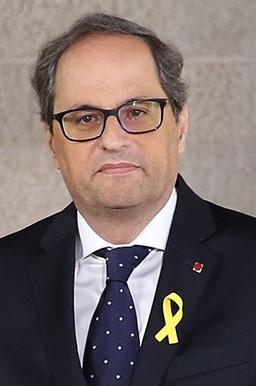Imagine you’re an ordinary guy, a writer and editor, say, who has a relatively low public profile but who is deeply committed to a political cause.
Then imagine that one day you are plucked from your life of books and culture and are instantly transformed into a politician, the leader of the very cause you have been supporting for much of your life.
This new job is strange and often unsettling. Firstly, people trawl through all the stuff you’ve ever written and start trying to use it as proof that you’re a hateful bigot and extremist. Then, you actually have to get on with the business of governing.
Sometimes it’s rewarding, as your supporters hang on your every word when you speak and they often cheer you.
But your adversaries are unremittingly hostile and, annoyingly, there’s infighting in your own camp. Then, to cap it all, your own lot, of who you were one not so long ago, start turning on you, telling you’re too timid and weak and should step down. What do you do?

Quim Torra: looking for the bogeyman.
If you’re Quim Torra, president of Catalonia, you lay down an ultimatum that says the Spanish prime minister has one month in which to accept that he must stage a binding referendum on Catalan independence or else pro-independence parties will withdraw their parliamentary support for him, almost certainly bringing down his government.
The above may look like some kind of political version of a Struwwelpeter fairy tale, but it’s basically what has happened to Torra since he took office in May.
It would be a difficult situation for a seasoned politico to handle, but for Torra, who is entirely new to all of this, it must be a nightmare. Take that ultimatum, for example. It turns out that, before issuing it, he hadn’t consulted with the pro-independence parties involved, leaving them as astonished as prime minister Pedro Sánchez and unconvinced by the idea. As a result, Torra already seems to be gingerly defusing the bomb he had set to go off in early November.
The pressures on him are clear to see, particularly from the more radical factions of the Catalan independence movement, who are agitating for their government to abandon its supposed autonomismo – the acceptance of the existing Spanish territorial framework – and to return to the path of independence. Thus Torra’s panic-laden speech on October 1st, when he praised his “friends” in the Committees for the Defence of the Republic (CDR) and the “pressure” they were exerting via direct action.
He has also called on Catalans to “attack” the Spanish state and announced that he is willing “to go as far as president [Carles] Puigdemont went”.
Such rhetoric, along with the referendum ultimatum, would make more sense if aimed at a Spanish government led by Mariano Rajoy. But perhaps the biggest problem for Torra, and the independence movement as a whole right now, is the relative moderation of the administration of Pedro Sánchez.
The secessionist cause has flourished on the premise that the Spanish state is led by a repressive cabal of corrupt right-wing ideologues. Between 2011 and June 1st 2018, the Popular Party (PP) government of Rajoy did plenty to cheerfully feed that notion.
But for the last four months, a different Spanish government has been in place. Its cabinet is dominated by women, it welcomed the Aquarius migrant boat to Spain after it had been shunned by Italy, plans to dig up Franco are underway and the prime minister speaks English, looks cool in shades and goes to Killers gigs.
That’s all just gesture politics, you might say. And what’s more, Sánchez’s government has been beset by scandals, ranging from academic plagiarism to tax evasion and deep state intrigue, and his immigration policy has turned out to be less liberal than initially thought.
Yet his government is genuinely not like Rajoy’s in many respects, above all when it comes to Catalonia. Sánchez has made substantial efforts to restore bilateral ties with the region, to listen to longstanding grievances and generally to tone down the hysteria on all sides.
For the Catalan government this is a problem because it needs a bogeyman in Madrid. Its response has been to play down all the above efforts to improve relations and big up the one thing that Sánchez and Rajoy do have in common: a refusal to consider staging a binding, Scotland-style independence referendum.
When Torra laid down his ultimatum, he already knew the answer would be no; we all did. If Sánchez even mooted the idea of holding an independence referendum, the ensuing national uproar would be deafening, both on the political right and within his own party. Sánchez would probably be out of a job within days.
That’s not to say he has much longer in the job anyway. The current instability in Catalonia means that Sánchez is now looking at bringing the general election forward from 2020. That could feasibly usher in a new right-wing administration: a combination of Pablo Casado’s PP and Albert Rivera’s Ciudadanos, who are currently locked in an anti-separatist arms race. For both those politicians, dialogue has become something akin to a four-letter word and their rhetoric on Catalonia is much more proactive and belligerent than that of the passive Rajoy.
Supporters of Catalan independence might welcome such a dream team, or at least the idea of it. They would expect to thrive against a right-wing regime that is intent on pandering to the basest of unionist instincts.
They may well be right. It would certainly be much easier to unite and mobilise against a prime minister Rivera, say, than a prime minister Sánchez. In such a scenario, support for independence might well tip over that magic, longed-for, 50-percent mark. The problem is, the collateral damage could dwarf the benefits for all involved.
So it might be advisable to be careful what you wish for.
0 Comments